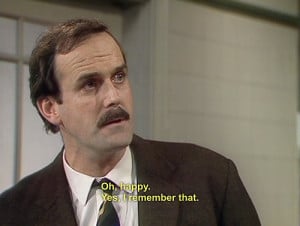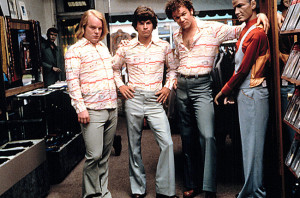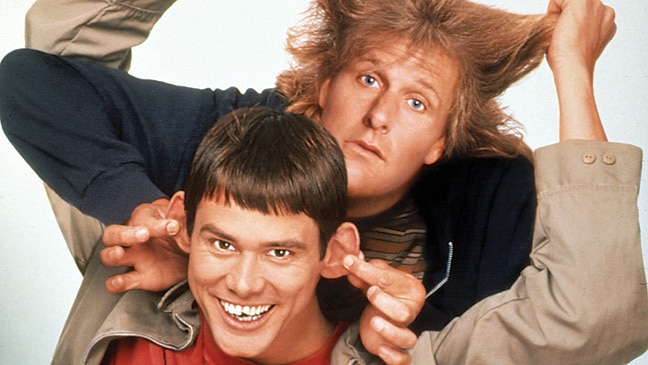In a giant sea of screenwriting tips and advice, where does one begin? It’s almost as bad as dieting these days. Cranberries are bad for you. No, scrap that, we’ve now decided they’re good for you. Your protagonist should dominate most scenes. It’s fine for your protagonist to drift in and out, to strengthen your B Story. Be conceptual, concepts sell. No, write what you know and be naturalistic – use and develop your “voice”.
A new screenwriter would be entitled to feel like “Indecisive Dave” from
You were once in love with your writing, screenplays veritably flowed from your mind onto the page. You were happy. Or maybe you’re about to take on that project you’ve been putting-off for a while and just want some refresher tips.
Which tips and tidbits of advice should you follow? How do you know what’s helpful and what’ll be a hindrance? Who’s even giving this advice? Fear not. Industrial Scripts is here to help with the only screenwriting tips worth keeping…
TOP 5 SCREENWRITING TIPS
1) “Write whatever you want” – Jonathan Nolan
Jonathan Nolan, co-screenwriter of blockbuster mega-hits THE DARK KNIGHT, THE DARK KNIGHT RISES, and INTERSTELLAR swears by this tip.
“Write what you know” is the least useful maxim for writers. It’s nonsense. You should write whatever you want.
Of course, this isn’t to say that what you know wouldn’t make a good film. If, for example, you’re in fact a secret agent and therefore what you know is super interesting and cool then write about it. You may well have the next JAMES BOND/U.N.C.L.E/MISSION IMPOSSIBLE-style franchise hit on your hands.
However, if, like most of us, you’re not a super-spy then this shouldn’t forbid you from writing. Instead, use your imagination. Write whatever you want to write, whether that be a gritty hospital drama based upon your own experiences or a space-fantasy epic on the scale of STAR WARS or STAR TREK. After all, did George Lucas or J.J. Abrams ever visit alien worlds?
So in short, don’t write what you know, but write what you know you’d want to see.
2) “Make stuff up, but keep it real”– Tony Gilroy

Tony Gilroy, screenwriter of the JASON BOURNE franchise and sci-fi disaster flick, ARMAGEDDON, says:
The quality of your writing will be directly related to your understanding of human behaviour. You need to become a journalist for the movie that is in your head. You need to report on it; every scene has to be real.
Just because a film requires real human behaviour and most importantly emotion, this shouldn’t discourage you from writing scripts that deal with non-humans.
PIXAR are masters of both capturing and transplanting human behaviour into non-human situations. It’s a big reason why their films are so enjoyable. Take FINDING NEMO for example, it’s about talking fish. But the relationship between father and son is so real on-screen that we, as humans, can really relate to it and as such the story really resonates with us.
Make stuff up, but keep human behaviour and emotions real.
3) “Everyone has a reason to live” – Joss Whedon
This screenwriting tip comes straight from the mouth of Joss Whedon. The man responsible for Hollywood mega-hits, THE AVENGERS, and its sequel, AGE OF ULTRON.
Everybody has a perspective. Everybody in your scene has a reason. They have their own voice, their own identity, their own history… But if you don’t know who everybody is and why they’re there, why they’re feeling what they’re feeling and why they’re doing what they’re doing, then you’re in trouble.
Follow this tip and you’ll ensure that your screenplay is filled with characters who have purpose. There shouldn’t be any redundant characters, everyone should offer something either to the plot or by helping shape other characters. If they can do both, that’s even better.
Remember also that since everyone has a reason to live, their speech patterns should also be unique. After all, like Whedon says, they have their own voice. As such, no character should ever sound like they’re merely there to set up other characters’ dialogue. Instead, look at the conversation you’re writing from both sides, what are each characters reasons for living? You’ll find they have different outlooks on the world and you may even find interesting subtext arises which gives your screenplay another dimension.
4) “Follow your characters around, let them drive the action” – P. T. Anderson
Literally in the case of Paul Thomas Anderson. He recalls one
Eventually I started writing all that stuff down. A lot of Jim’s dialogue is based on that improvisation. It really is a pretty f*cking cool way to work. We’ve gotta try that again.
The ‘Jim’ in question is L.A cop Jim Kurring from MAGNOLIA. You don’t actually have to find an actor and go following them around the streets with a camera, but the principle should be the same. It is your job as the screenwriter to let the character drive the action forwards. They should make choices and decisions that directly impact their own situation, they should not be swept along by events.
That said, it is ok to let your character get into situations where they aren’t in complete control – the bigger the conflict, the bigger the reward – but you must let your character control their reaction. They must decide what course of action to take, not have outside forces make it for them.
5) “Conflict reveals character” – Robert McKee
Following on from the PT Anderson tip, comes this advice from screenwriting guru, Robert McKee.
True character is revealed in the choices a human being makes under pressure – the greater the pressure, the deeper the revelation, the truer the choice to the character’s essential nature.
Thus it’s necessary for each test your character(s) face to increase with difficulty. Take STAR WARS for example:
- Luke and Obi-Wan must escape the Mos Eisley space port.
- Then Luke and Han must rescue Leia AND escape the trash compactor.
- Having done this they must then escape the Death Star under heavy fire whilst Obi-Wan fights Vader.
- The final test is Luke must fly a ship into a heavily guarded ship and fire a missile at a tiny target all whilst being chased by the Empire’s TIE Fighters and Darth Vader.
Luke’s challenges become increasingly hostile yet as they progress Luke’s character is revealed. By the end he is no longer the scared, self-doubting farmboy but instead a confident fighter-pilot who trusts in the Force.
You don’t have to start small with your conflict. Novelist Matthew Reilly‘s books are superb examples of rising conflict. But he’ll start with a huge action set-piece and make each subsequent challenge even bigger and more dangerous. It’ll come as no surprise therefore that he has great, memorable characters.
OTHER TOP TIPS
6) “The first act is critical” – Billy Wilder
Screenwriting legend, Billy Wilder, was a firm believer in the ideal that the first act is responsible for your entire movie.
If you have a problem with the third act, the real problem is in the first act.
A lot is said of screenwriting structure and how to write a screenplay, yet often emphasis is placed on the finale of act three, or the struggles of act two.
Wilder talks more on the subject stating that the event that occurs at the end of the second act must trigger the end of the movie. As for the third act, it “must build, build, build in tempo and action until the last event, and then—that’s it. Don’t hang around.”
So the second act is there to trigger the third, and the third is just there to provide an increasingly tense action climax. This means that anything that may occur in the third must be set-up in the first.
If you’re struggling with a scene in act three, you need to revisit act one and find the linked scene. Otherwise you risk a ‘deus ex machina’ ending that will leave your audience unsatisfied.
7) “Take inspiration from anywhere you can get it, including script coverage and gurus” – Hossein Amini
Let’s face it, if you’ve decided to be a screenwriter or filmmaker, you already know the scale of the challenge facing you. In elite sport, people talk about “micro-gains” and in ANY GIVEN SUNDAY, Al Pacino delivered his famous “life’s a game of inches” speech.
https://www.youtube.com/watch?v=17rAxDB4Jw4
I read all books about screenwriting because you retain what you believe in & discard the rest – Andrew Kevin Walker (SE7EN)
Anything that stimulates you to get up and write the next day is great – Hoss Amini (DRIVE)
In a field as competitive as screenplay writing, who cares where you get that edge from?
You’ll need every “micro-gain” you can lay your hands on just to stand a chance of being successful. So read all the screenwriting books, absorb all the theory, discard what you like and what works for you and ignore the rest. Go and work in a cabin in the woods if it helps. Book script coverage on your work if you find you improve as a result, and don’t bother if you don’t. Start working out like crazy around your writing regimen. Get a pet, go swimming, start playing chess online. Basically do whatever’s necessary to gain an advantage.
Why? Because it’s too competitive not to.
8) Drama doesn’t need minute detail – Alfred Hitchcock
Movies are heightened reflections of reality. No-one goes to the cinema expecting to see your character perform every action of their day. As the great Alfred Hitchcock once said:
Drama is real life with the boring parts cut out.
We do not need to see every movement your character makes unless it’s important. Walking to work for the sake of getting there? Cut.
But if they’re walking to work and then they get mugged/meet the love-interest and this is the inciting incident of your plot? Keep it.
It’s not just in terms of action either. Another tip from P. T. Anderson that fits well here is ‘bad movie dialogue speaks in complete sentences without any overlapping or interruption, and avoids elliptical speech’. Thus drama created through conversation should also abide by Hitchcock and Anderson’s advice.
9) “The script is what you’ve dreamed up” – George Lucas
It’s all too easy to shy away from writing things that 
The script is what you’ve dreamed up–this is what it should be. The film is what you end up with.
In short, it is your story, and nobody knows how to tell it better than you do. Thus if you feel the story needs a car chase through the Vatican that ends up blowing up the Colosseum, then write it.
Obviously George isn’t advising you to throw caution to the wind and write in totally gargantuan budgets… just don’t be afraid to tell the story you want to tell in the way you want to tell it.
At the other end-of the spectrum, avoid the temptation to manipulate your story into something it’s not. Don’t try and force your story to become Oscar-bait. If you dreamed up a goofy, buddy comedy then write a goofy, buddy comedy, just don’t try and flip it half-way through so that it then becomes a deep and unfunny piece designed to pull at Academy members’ ballot papers. Create something that does what it says on the tin.
Perfect the script as best you can on the page and then let it go. If the director is good, they’ll be able to capture your vision and hopefully shoot it as close to the script as possible. Other times, it won’t be the case, and so if the film stinks at least you can say, the script was so much better than that.
10) “Don’t underestimate your audience’s intelligence” – Michael Mann + Mark Kermode
Audiences are not stupid and in fact are becoming more and more cine-literate with every passing year. You forget that at your peril. In the age of the mega-hit, there’s the option to skimp on story and just throw in a ton of explosive action sequences to keep the audience happy. Michael Bay. After all, in a world where no summer blockbuster really ever truly flops, why change this ‘winning’ formula? For reference, even Josh Trank’s now-notorious superhero reboot, FANTASTIC FOUR, has made back its reported $122million budget.
I don’t underestimate audiences’ intelligence. Audiences are much brighter than media gives them credit for. – Michael Mann
It is a screenwriting tip worth remembering as the temptation will always be there to avoid being clever and trying to innovate for the sake of huge explosions and guns and helicopters. Of course, by following or even not following this tip is it guaranteed that your movie will succeed; even TRANSFORMERS grossed over $700m but then-again, INCEPTION grossed over $800m. As Mark Kermode says:
Why be Michael Bay when you can be Christopher Nolan? – Mark Kermode
The worst thing a movie can do is be boring. Dull. Disinteresting. Read the critics’ reviews of FANTASTIC FOUR and you’ll find its biggest crime was exactly that. If your script talks down to the audience, they’ll get pretty bored pretty quickly and that is a guaranteed recipe for disaster.
An audience will forgive you for trying to be clever as they’ll understand that you respect them. They won’t, however, enjoy you spoon-feeding them the obvious because modern-day audiences are very much capable of figuring things out for themselves…
If you enjoyed this article, why not check out our article: In Script Development Nobody Knows Anything?
– What did you think of this article? Share it, Like it, give it a rating, and let us know your thoughts in the comments box further down…
– Struggling with a script or book? Story analysis is what we do, all day, every day… check out our range of services for writers & filmmakers here.
Get *ALL* our FREE Resources
Tackle the trickiest areas of screenwriting with our exclusive eBooks. Get all our FREE resources when you join 60,000 filmmakers on our mailing list!



Great refresher…I am adapting my novel: Hot Blooded Murder, A Bryn Wiley Mystery, to an hour-long TV series pilot, in response to a call for such a series based in the Deep South and involving horses. I have the owner of a stud farm murdered, her stallion looks like the killer…and Bryn Wiley sets out to save him from a lethal injection. The book gets excellent reviews—so far no one has been able to determine “whodunit” even though I planted clues all along the way. Wish me luck, y’all!